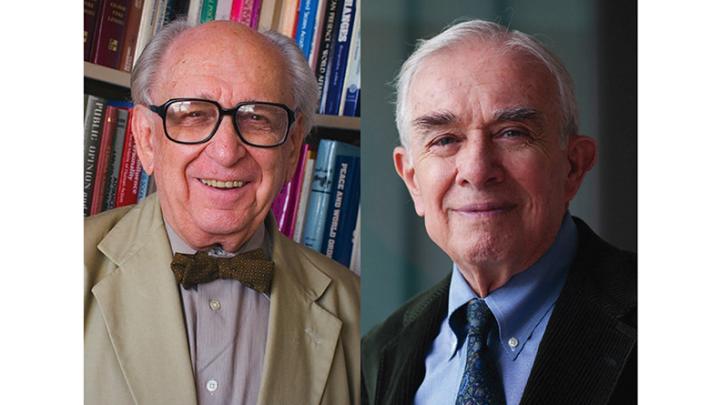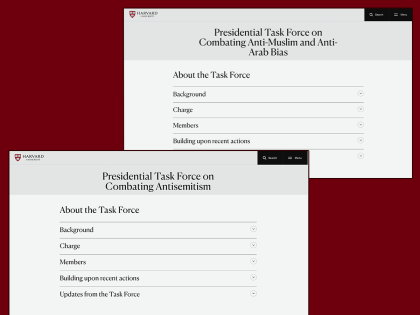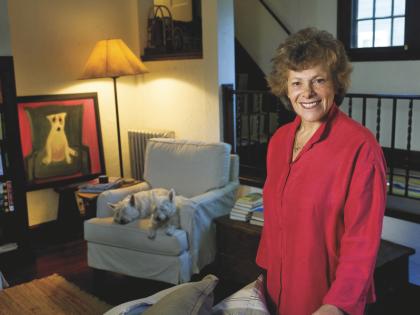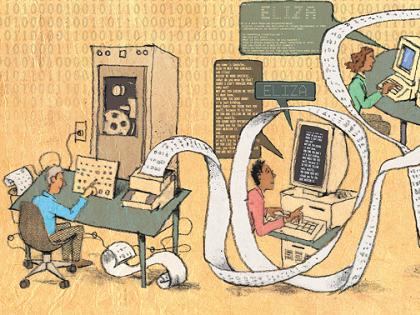As the world has been shaken by renewed terrorism and war in the Middle East—with accompanying, divisive shocks on this and other campuses during the past academic year—it was poignant that the Faculty of Arts and Sciences’ (FAS) memorial minutes honoring deceased colleagues presented at the April 2 faculty meeting each touched on the lives of professors who labored long and hard to de-escalate the historic enmities among peoples around the world.
Herbert C. Kelman, the late Cabot professor of ethics emeritus, was a social psychologist whose Yale graduate training came at a time when the U.S. government was very concerned, as the memorial minute puts it, with “understanding the success of Nazi propaganda campaigns,” resulting in the “first experimental attempt to answer a national call to respond to the threat posed by the mass communication of misinformation.” (Of relevance today, one notes.) Kelman became interested in “the relevance of social psychological analysis and research to issues of war and peace”—a thread that led to inquiries into the relationship between individuals and nation-states, and a lifetime of engagement with conflict resolution.
In 1967, during the Six-Day War, he experimented with “third-party participant” means of addressing conflicts, gathering academic experts and political elites for informal, confidential consultations. Cabot professor from 1968 to 1999, he worked that approach tirelessly, an “evolving model of conflict resolution in what is arguably the most high-stakes situation in which any academic psychologist has dared to participate. Both Israeli and Palestinian observers stated that his efforts paved the way to the Oslo Agreement.” During four decades, he conducted more than 70 workshops, mostly on the Israeli-Palestinian conflict, but also addressing the Balkans, Northern Ireland, Colombia, Sri Lanka, and Cuba.
Not all of those efforts succeeded, obviously. But matters might have been even worse had he not tried. “Until the end of his life,” the memorial text notes, “even when reason to hope was fading, he believed that the outcome of major political events could be changed using conditions for dialogue that apply the principles [including] confidentiality and trust.” Maintaining that faith despite interim failures seems a fitting tribute to Kelman’s worldly work, which complemented his notable scholarship.
The memorial minute on Everett I. Mendelsohn, the late professor of the history of science emeritus, begins by characterizing him as “a huge force for good…as a dedicated pacifist, a talented negotiator, and a remarkable mentor and teacher”—and a pioneer in a discipline that was nascent when he entered it. Those who knew him also recall his humor and warmth: “He liked to say that he was the only Jewish Quaker that he knew.”
Shortly after he began graduate study at Harvard in 1953, he was called in to see the FAS dean, McGeorge Bundy. “Apparently, Everett had been identified as a Marxist sympathizer on one of the lists circulated by right-wing groups. Dean Bundy asked Everett if he was a communist. Everett said that he was not, but that he was a socialist. Bundy did not pursue the matter and later apologized for the incident.” Uninjured by the encounter, Mendelsohn earned his Ph.D. in 1960, and five years later began developing “The Social Context of Science,” a General Education course that managed to cover atomic and chemical weapons, eugenics, the history of racism, genetic engineering, etc.
He was an outspoken critic of the Vietnam War; on a trip for the American Friends Service Committee, he was visiting Vietnam, Thailand, and Cambodia during the beginning of the Tet Offensive. And he later “participated in structured dialogues seeking solutions to the Israeli–Palestinian conflict. These actions laid some of the groundwork for the Oslo Accords.” (Sound familiar?) He led and founded several organizations actively pursuing nuclear disarmament and arms control. On campus, he is perhaps most fondly remembered, with his wife Mary B. Anderson, as faculty dean of Dudley House; the Everett Mendelsohn Excellence in Mentoring Award, conferred by graduate students on faculty members, captures the man’s spirit.
In both cases, and in the best sense, these two scholars’ animating spirits were large—embracing the academy, and the lot of mankind. Notwithstanding current world troubles, there’s ample reason to keep that spirit alive.








